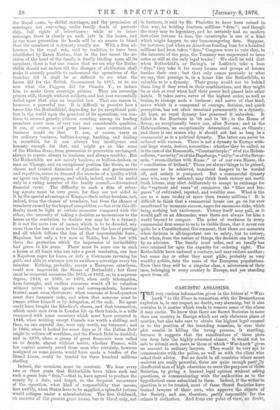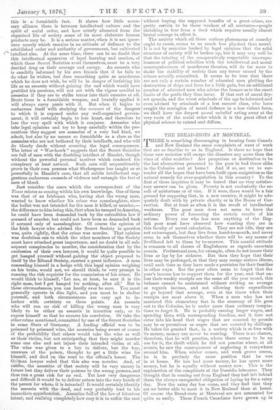CASUISTIC ASSASSINS.
very curious information given in the letters of " War- hawk " to the Times in connection with the Bremerhaven explosion is, in one respect no doubt, very alarming, but it also contains in it matter which tends to remove some of the alarm it may excite. To know that there are Secret Societies in more than one country in Europe which not only elaborate plans of murder, but also take care to obtain the highest legal counsel as to the position of the intending assassins, in case their plot results in killing the wrong persons, is startling, because it suggests that the ramifications of these plots run deep into the highly educated classes. It would not be safe to submit such cases as those of which "War-hawk" gives an account to ordinary lawyers. They would be very apt to communicate with the police, as well as with the client who asked their advice. But no doubt in all countries where secret societies are really powerful, there are quite enough part: disaffected men of high edacation to serve the purposes of tgse Societies, by giving a learned legal opinion without asking questions, or communicating with the authorities as to the hypothetical cases submitted to them. Indeed, if the writer in question is to be trusted, most of these Secret Societies have trained lawyers of their own, who approve the objects of the Society, and are, therefore, partly responsible for the crimes it authorises. And from one point of view, no doubt,
this is a formidable fact. It shows how little neces-
sary alliance there is between intellectual culture and the spirit of social order, and how utterly alienated from the organised life of society some of its most elaborate human products may be. It is a serious matter, when it is not ignor- ance merely which remains in an attitude of defiance to the established order and authority of government, but cultivated intellect also. At the same time, there can be no doubt that this intellectual apparatus of legal learning and caution, of which these Secret Societies avail themselves, must be a very decided drag on their courage and energy. An assassin who is candidly informed by his own friends that if he fails to do what he wishes, but does something quite as murderous which he does not wish, he will be in danger of forfeiting his life as an assassin without gaining the end which would have gratified his passions, will not act with the vigour needful to assassins if they are to strike terror into their enemies at all. Brute force is a formidable weapon, and brutally applied it will always carry panic with it. But when it begins to embarrass itself with studying the nuances of the dangers to which it is exposed under any well-organised govern- ment, it will certainly begin to lose heart, and therefore to lose the very spell with which it conjures. Assassins who take legal opinions and try to keep carefully within the pre- cautions they suggest are assassins of a very bad kind, we admit, but also by no means so formidable as a class as the assassins who are not bothered by their intellects, and who will do bloody deeds without counting the legal consequences. The letter of " War-hawk " suggests that the Secret Societies are full of men with the disabling intellect of Hamlet, though without the powerful personal motives which rendered his conspiracy at least natural. Such men will unquestionably prove in their own persons what Shakespeare has taught us so powerfully in Hamlet's case, that all subtle intellectual sug- gestions embarrass counsels of violence and entangle the feet of men of blood.
Just consider the cases which the correspondent of the Times relates as coming within his own knowledge. One of them was that of an Irishman who, having shot the wrong man, wanted to know whether his crime was manslaughter, since the bullet was not inteeded for the man it killed, or murder,— the difference to him being this, that when he escaped to America, he could have been demanded back by the extradition law if accused of murder, but could not have beets so demanded back if accused only of manslaughter. Of cOurse the opinion of the Irish lawyer. who advised the Secret Society in question was, quite rightly, that the crime was murder. That opinion was doubtless one to which the other members of the Society must have attached great importance, and no doubt in all sub- sequent conspiracies to murder, the consideration that by the confession of their own lawyers, it would be quite possible to get hanged yourself without gaining the object proposed to itself by the Ribanel Society, exerted a great influence. A Man concealing himself in a hedge with this legal opinion weighing on his brain, would not, we should think, be very prompt in running the risk requisite for the commission of his crime. He would think to himself, Let me, at least, be sure it is the right man, lest I get hanged for nothing, after all.' But in these circumstances, you can hardly ever be sure. You must generally operate in dim light, and you must be in shelter yourself, and both circumstances are very apt to in- terfere with certainty on these points. An assassin who will ran no risk of killing the wrong man is very likely to be either an assassin in intention only, or to expose himself so that he ensues his conviction. Or take the other crime mentioned, committed by one of the Secret Societies in some State of Germany. A leading official was to be poisoned by poisoned wine, the assassins being aware of course of the probability that others would take the wine as well as their victim, but not anticipating that they might murder some one else and not injure their intended victim at all. The wine was given to a boy to deliver, but the boy, unaware of the poison, thought to get a little wine for himself, and died on the road to the official's house. The Grelsaan lawyer ruled that this also was murder. And, of course, the assassins of that society will be very uneasy in future lest they deliver their poisons to the wrong persons, and thus run a great risk for• no end. Yet how very dangerous and difficult it would be to deliver poison into the very hands a the pariah for whom it is intended! It Would certainly identify the assassin with the deed, and very probably lead to his immediate apprehension. Assassins full of the law of felonious intent, and realising completely how easy it is to suffer the cost
without baying the supposed benefits of a great crime, are pretty certain to be those weakest of all creatures—people ehrinking in fear from a deed which requires usually almost brutal courage to effect it.
The anxiety which all these curious phenomena of anarchy ought to cause, seems to us much less physical than moral. It is not by assassins backed by legal opinions that the solid structure of society will be broken up, but it may very well be that the tainting of the comparatively respectable unscrupu- lousness of political rebellion with the intellectual and moral unscrupulousness of murderous theories, will do far more to shake the stability of society than any terror caused by the crimes actually committed. It seems to be true that there are not only a certain number of educated men plotting the destruction of ships and lives for a little gain, but an additional number of educated men who advise the former as to the exact limits of the perils they thus incur. If that sort of moral dry- rot spreads, and the worst criminals of the age be tolerated and even advised by criminals of a less earnest class, who have caught the contagion of moral defiance in a less violent form, we shall have the deepest moral unbelief eating away at the very roots of the social order which it is the great effort of physical science to extend and diffuse.



































 Previous page
Previous page